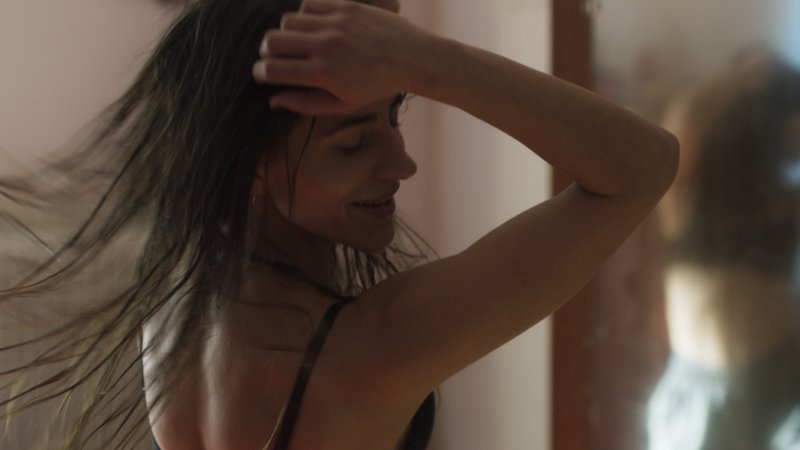Behind the Haystacks screens at the Sydney Film Festival on June 10 and 11.
Asimina Proedrou’s debut feature, Behind the Haystacks is a modern morality tale. Set in Greece near the border of Macedonia it tells the story of what appears to be an ordinary family. The father, Stergios (Stathis Stamoulakatos) is a co-op farm worker and fisherman. His wife Maria (Lena Ouzounidou) is deeply religious and works as a volunteer for the local church. Their daughter Anastasia (Evgenia Lavda) is coming into her own as an adult but is still overshadowed by Stergios and the control he has on the household. They are close with their neighbours, especially Georgia (Dina Mihailidou) who spends her time helping Syrian refugees, and her son Christos (Christos Kontogeorgis) who regularly farms and fishes with Stergios. They appear to be utterly unremarkable but Proedrou uses their seemingly quotidian lives to tell a much deeper story of hypocrisy and moral cowardice.
The film begins with children finding the bodies of two drowned people which barely registers with many celebrating at a large outdoor party. The film circles back to this scene at the end after all the blanks of what truly happened are filled in. Using the framing device to then split the story into three chapters titled after each family member Proedrou teases out a devastating narrative about xenophobia, patriarchal control, religious bigotry, and the measures people will undertake to avoid personal responsibility.
The story is primarily focussed on Stergios as it is his cumulative actions which place himself and others in danger. The co-op has been stealing from the farmers. He is quickly running out of money and he gets a letter from the tax department telling him he will go to jail unless he pays a fine for some records he fudged on the advice of his brother-in-law Dimitris (Paschalis Tsarouhas) a man who he intensely dislikes and also one who runs the local crime syndicate. Stergios makes a deal with the devil and agrees to use his boat to traffic refugees across Doiran Lake which shares a shore with Greece and Northern Macedonia.
His actions have tragic consequences that are further compounded. Yet his is far from the only sin. As we move into Maria’s section, we see a woman who pretends Godliness but is more concerned with her position in the community. She is resistant to help Georgia give aid to the refugees living in camps outside their town because the local orthodox church has claimed it “sinful to help” refugees – which can only be based on the fact they are predominantly Muslim. She relents and does help Georgia but when it comes time to show moral courage she utterly fails.
The third section belongs to Anastasia and introduces a plot element that seems a little far-fetched, however it is essential to how she is manipulated by her parents to act against her own ethical code. The little white lies she told Stergios and Maria while trying to become her own person double back on her and she perceives herself as responsible for a tragedy she had nothing to do with.
As each section puts the puzzle pieces together the audience is presented with a chilling conclusion. Anastasia is mostly innocent outside of what she did for her father, but she also chided Stergios for not being an adequate provider and happily took money from her shady uncle. Stergios’ descent into hell is of his own making and Maria believes God will forgive her for doing anything to protect her family (in this case mostly her own reputation). The couple are aided by large sections of the community and Dimitris who will not let his enterprise be interrupted.
The plight of the refugees is an ever-present background to what is happening with Stergios and his family. Proedrou is not presenting a straightforward refugee drama but instead a vision of a society that is hostile to, and venal with, people struggling to stay alive during one of the biggest refugee crises in the twenty-first century. The fact that they exist on the periphery is Proedrou subtly damning Greek society for ignoring human suffering. Proedrou isn’t offering answers, she is showing how easy it is for people to avoid taking responsibility.
Behind the Haystacks is both poetic and caustic. The scenes of the lake are otherworldly. Each chapter begins with a character in the eerie waters that metaphorically become the River Styx where men have become Charon asking for a fare to ferry souls. As the film nears its end the party revellers sing a folk song with the lyrics “He who sets foot in the underworld never comes back” – they are mostly drunk and grotesque. We can see Maria singing and clapping along. Proedrou’s Bacchanalian metaphor might be a little heavy-handed there, but deliberately so. Where is our collective empathy? What are we doing when we can treat people as cargo and commodities? How have we grown as a society? When do we stop celebrating ourselves for doing the least we can do and congratulating ourselves that we are not the ones suffering?
Director: Asimina Proedrou
Cast: Stathis Stamoulakatos, Lena Ouzounidou, Evgenia Lavda
Writer: Asimina Proedrou



